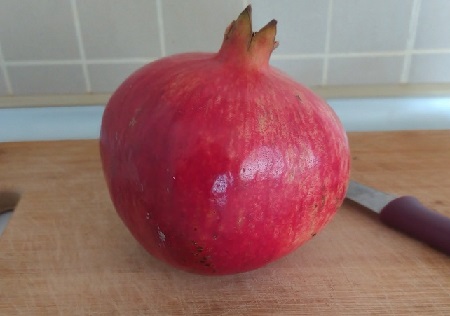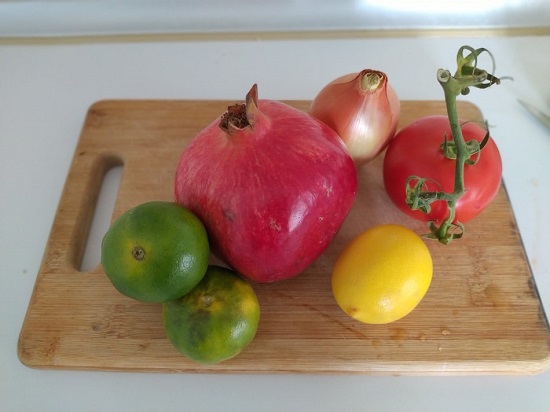Seasonal fruits should be consumed for colds and addiction. During the day, foods containing vitamin C such as tomatoes, fresh peppers, arugula, parsley, tangerines, grapefruit, oranges, pomegranates, rose hips and kiwi should be consumed.
Fruits can be beneficial when you have a cold because they are rich in vitamins, antioxidants, and hydration. They can help boost your immune system and provide relief from some cold symptoms. Here are some fruits that are good to consume when you have a cold:
- Citrus Fruits: Citrus fruits like oranges, lemons, grapefruits, and limes are high in vitamin C, which can help strengthen your immune system. They also provide hydration and can soothe a sore throat.
- Berries: Berries such as strawberries, blueberries, and raspberries are packed with antioxidants, which can help reduce inflammation and boost your immune response.
- Pineapple: Pineapple contains bromelain, an enzyme that may help reduce mucus and congestion, making it easier to breathe.
- Kiwi: Kiwi is another fruit that is exceptionally high in vitamin C and can help enhance your body’s ability to fight off infections.
- Bananas: Bananas are easy to digest and provide a good source of potassium, which is essential for maintaining electrolyte balance in your body. They can also help soothe an upset stomach.
- Watermelon: Watermelon is hydrating and can help with staying properly hydrated, which is important when you have a cold.
- Apples: Apples contain antioxidants and dietary fiber, which can help support your immune system and provide some relief from congestion.
- Pomegranate: Pomegranates are rich in antioxidants and can help reduce inflammation in the body.
- Mango: Mangoes are rich in vitamin C and vitamin A, which can help boost your immune system and provide relief from cold symptoms.
- Ginger: While not a fruit, ginger is often used in combination with fruits in teas and other remedies. It has anti-inflammatory and soothing properties and can help with nausea and sore throat.

Remember to drink plenty of fluids, including water and herbal teas, to stay hydrated. These fruits can be consumed in various forms, such as fresh, in smoothies, or as part of fruit salads. They can be particularly helpful in alleviating symptoms and supporting your recovery from a cold.
Which herb is good for cold?
Several herbs are known for their potential benefits in alleviating the symptoms of a cold and supporting your immune system. Some of the herbs commonly used for cold relief include:
- Echinacea: Echinacea is one of the most popular herbs for boosting the immune system and reducing the severity and duration of cold symptoms. It is available in various forms, including teas and supplements.
- Ginger: Ginger has anti-inflammatory and antioxidant properties, which can help soothe a sore throat, reduce congestion, and ease nausea. Ginger tea is a common remedy for colds.
- Peppermint: Peppermint can help relieve congestion and soothe a sore throat. Peppermint tea or inhaling its vapor can be particularly effective.
- Eucalyptus: Eucalyptus leaves or oil can be used to make steam inhalations, which can provide relief from nasal congestion and help clear the airways.
- Garlic: Garlic contains allicin, a compound with antimicrobial properties that can help fight off infections. Adding garlic to your diet or taking garlic supplements may provide immune support.
- Oregano: Oregano is rich in antioxidants and has antimicrobial properties. Oregano oil is commonly used to combat cold symptoms.
- Chamomile: Chamomile has anti-inflammatory and soothing properties. Chamomile tea can help with relaxation and reduce cold-related stress.
- Thyme: Thyme has antimicrobial properties and can be used in teas or added to soups to help ease cold symptoms.
- Licorice Root: Licorice root can help soothe a sore throat and reduce coughing. It is often found in herbal teas and lozenges.
- Lemon Balm: Lemon balm has antiviral properties and is known for its soothing effects. It can be consumed as a tea or in combination with other herbs.
- Nettle: Nettle is used to reduce inflammation and relieve allergy symptoms, which can be helpful during a cold.

When using herbs for cold relief, it’s essential to follow recommended dosages and consult with a healthcare professional, especially if you have underlying medical conditions or are taking medications. Herbs can interact with other substances, so it’s important to use them with caution. Additionally, if your cold symptoms persist or worsen, it’s advisable to seek medical advice.
What 7 herbs help fight flu and cold?
Several herbs are believed to help combat flu and cold symptoms due to their immune-boosting, anti-inflammatory, and antimicrobial properties. Here are seven herbs commonly used for this purpose:
- Echinacea: Echinacea is known for its ability to support the immune system and reduce the severity and duration of cold and flu symptoms. It’s often used in the form of echinacea tea or supplements.
- Ginger: Ginger has anti-inflammatory and antioxidant properties, making it effective for soothing sore throats, reducing congestion, and alleviating nausea. You can make ginger tea or add fresh ginger to your meals.
- Elderberry: Elderberry is rich in antioxidants and has antiviral properties. It is commonly used in the form of elderberry syrup or capsules to help combat the flu and cold.
- Garlic: Garlic contains allicin, a compound with antimicrobial properties that can help the body fight off infections. Adding garlic to your diet or taking garlic supplements may provide immune support.
- Peppermint: Peppermint is useful for relieving congestion, soothing sore throats, and reducing coughing. Peppermint tea or inhaling its vapor can be particularly effective.
- Oregano: Oregano is known for its antimicrobial properties. Oregano oil or dried oregano leaves can be used to make herbal teas or added to meals.
- Lemon Balm: Lemon balm has antiviral properties and can be used to relieve stress and anxiety, which can often accompany flu and cold symptoms. It’s typically consumed as a tea or in combination with other herbs.
Remember that while these herbs can offer relief from cold and flu symptoms, they are not a substitute for medical treatment. If your symptoms are severe or persist, it’s essential to consult with a healthcare professional for proper diagnosis and treatment. Additionally, be mindful of any potential interactions with medications you may be taking and follow recommended dosages for herbal remedies.
What foods are best to fight a cold?
Eating a well-balanced and nutritious diet is essential for maintaining a healthy immune system and can help your body fight off colds and other illnesses. When you have a cold, certain foods can provide comfort and symptom relief. Here are some foods that are beneficial when trying to fight a cold:
- Chicken Soup: Chicken soup is a classic comfort food that can help relieve congestion and soothe a sore throat. It’s hydrating, contains important nutrients, and may have mild anti-inflammatory properties.
- Citrus Fruits: Oranges, lemons, grapefruits, and limes are high in vitamin C, which can boost your immune system and help reduce the duration and severity of cold symptoms.
- Garlic: Garlic has antimicrobial and immune-boosting properties. Adding garlic to your meals can help your body fight off infections.
- Ginger: Ginger has anti-inflammatory and antioxidant properties that can help soothe a sore throat, reduce congestion, and alleviate nausea. You can make ginger tea or add it to dishes.
- Honey: Honey can help soothe a sore throat and relieve coughing. It has natural antimicrobial properties and can be added to tea or consumed on its own.
- Hot Tea: Warm herbal teas, such as chamomile, peppermint, and ginger, can help with hydration, soothing sore throats, and providing comfort.
- Spicy Foods: Spicy foods like chili peppers contain capsaicin, which can help clear nasal passages and relieve congestion.
- Bananas: Bananas are easy to digest and can provide a good source of potassium, which is essential for maintaining electrolyte balance in your body. They can also help soothe an upset stomach.
- Broth-Based Soups: Other broth-based soups, such as vegetable or miso soup, can provide hydration and essential nutrients to support your recovery.
- Yogurt: Yogurt contains probiotics, which can support gut health and your overall immune system. It’s essential to maintain a healthy gut microbiome during illness.
- Oatmeal: Oatmeal is a nutritious and easy-to-digest option that provides energy and warmth. You can add honey, fruits, or nuts for extra flavor and nutrition.
- Pomegranate: Pomegranates are rich in antioxidants, which can help reduce inflammation and support your immune system.
It’s crucial to stay well-hydrated when you have a cold, so make sure to drink plenty of water, herbal teas, and clear broths. Additionally, rest is essential for recovery, so listen to your body and get adequate sleep.
While these foods can help with symptom relief and support your immune system, they are not a substitute for medical treatment. If your symptoms persist, worsen, or if you have underlying health conditions, it’s important to consult with a healthcare professional for proper diagnosis and treatment.
